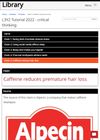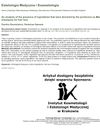 November 2021 in “Research Square (Research Square)”
November 2021 in “Research Square (Research Square)” The new caffeine cream works better for hair growth than existing products.
 April 2019 in “Journal of Investigative Dermatology”
April 2019 in “Journal of Investigative Dermatology” Caffeine can protect scalp hair follicles from damage caused by UV radiation.

The optimal concentration for caffeine release in gel form is 0.2% caffeine and 2.3% chitosan.
Nanoparticles with caffeine can be used for slow, continuous hair growth stimulation.

Caffeine in Alpecin shampoo may help prolong hair root activity and reduce hair loss.

Caffeine can potentially treat common hair loss by counteracting hair follicle shrinkage caused by hormones.
The caffeine shampoo for hair loss is stable and suitable for use.
 November 2013 in “Journal of Mazandaran University of Medical Sciences”
November 2013 in “Journal of Mazandaran University of Medical Sciences” Minoxidil with caffeine works better for hair loss than minoxidil alone.
5 citations,
October 2020 in “Giornale italiano di dermatologia e venereologia” The phyto-caffeine shampoo reduced hair loss and improved hair strength in women with hair thinning.
 42 citations,
July 2014 in “European journal of pharmaceutics and biopharmaceutics”
42 citations,
July 2014 in “European journal of pharmaceutics and biopharmaceutics” Caffeine nanocrystals for skin products stay stable with the right stabilizer, but grow in size at higher temperatures.
 6 citations,
January 2020 in “Skin Pharmacology and Physiology”
6 citations,
January 2020 in “Skin Pharmacology and Physiology” HIF-1α stimulators, like deferiprone, work as well as popular hair loss treatments, minoxidil and caffeine, in promoting hair growth.
 2 citations,
January 2022 in “Dermatologic Therapy”
2 citations,
January 2022 in “Dermatologic Therapy” Natural products like saw palmetto, caffeine, melatonin, marine extracts, rosemary oil, procyanidin, pumpkin seed oil, and cannabidiol oil could potentially treat male hair loss.
2 citations,
January 2014 Improved methods create smaller, more effective gelatin nanoparticles for skin delivery, and new caffeine nanocrystals enhance absorption and effectiveness.
 November 2023 in “Hair transplant forum international”
November 2023 in “Hair transplant forum international” Caffeine can stimulate hair growth, but the best dose and frequency for hair loss treatment are still unknown.
 September 2023 in “Authorea (Authorea)”
September 2023 in “Authorea (Authorea)” Certain peptides, caffeine, taurine, and an iron complex may improve hair regrowth when used with minoxidil and finasteride for hair loss.
Caffeine in cosmetics has antioxidant effects, protects against UV, reduces cellulite, and stimulates hair growth.
 67 citations,
November 2019 in “Molecules”
67 citations,
November 2019 in “Molecules” Tea, especially green tea, shows promise in cosmetics for skin and hair benefits but more research is needed for effective use.
 61 citations,
January 2018 in “Cosmetics”
61 citations,
January 2018 in “Cosmetics” Coffee silverskin may be a beneficial and safe ingredient for cosmetics, offering hydration, firmness, and potential hair growth benefits.
 46 citations,
October 2012 in “Dermatologic Clinics”
46 citations,
October 2012 in “Dermatologic Clinics” Female pattern hair loss diagnosed by scalp appearance, treated with combined therapies and targeted approaches.
 21 citations,
November 2012 in “Plastic and Reconstructive Surgery”
21 citations,
November 2012 in “Plastic and Reconstructive Surgery” Both genetic and lifestyle factors significantly affect female hair loss.
12 citations,
March 2012 in “ATLA. Alternatives to laboratory animals” Hair follicles significantly affect the skin absorption of some drugs.
6 citations,
August 2021 in “International Journal of Cosmetic Science” Using antioxidants on the scalp can make it healthier and decrease hair loss.
 3 citations,
January 2023 in “International Journal of Cosmetic Science”
3 citations,
January 2023 in “International Journal of Cosmetic Science” Coffee and its by-products are promising for skin health benefits in cosmetics and help reduce environmental impact.
 2 citations,
July 2021 in “Dermatologic Therapy”
2 citations,
July 2021 in “Dermatologic Therapy” A woman's hair loss after COVID-19 was likely due to a mix of pressure-induced alopecia and acute telogen effluvium.
 2 citations,
July 2018 in “Elsevier eBooks”
2 citations,
July 2018 in “Elsevier eBooks” Some supplements may help with hair loss, but there's not enough strong evidence to recommend them without doctor advice.
1 citations,
March 2022 in “Protection convergence” Fermented green coffee beans may be good for scalp and hair health cosmetics.
 1 citations,
March 2018 in “Dermatologie pro praxi”
1 citations,
March 2018 in “Dermatologie pro praxi” Most over-the-counter hair loss treatments lack strong evidence of effectiveness, except for minoxidil, which works but stops working if you stop using it.
 February 2024 in “Skin health and disease”
February 2024 in “Skin health and disease” Many popular skincare products claim to prevent aging but lack strong evidence to prove their effectiveness and safety.
 January 2024 in “Estetologia Medyczna i Kosmetologia”
January 2024 in “Estetologia Medyczna i Kosmetologia” Most hair loss shampoos have unproven active ingredients.





















